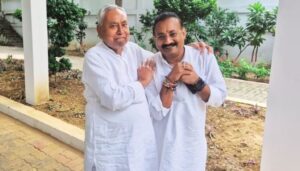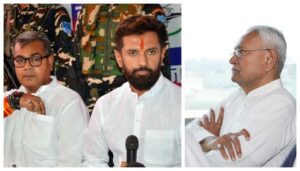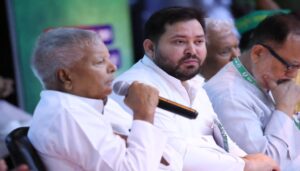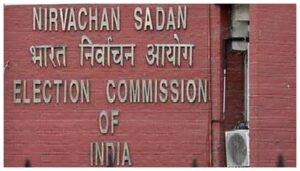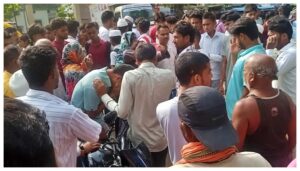Bihar: The Enigmatic Return of Anand Mohan Singh – A Glimpse into Saharsa’s Political Landscape
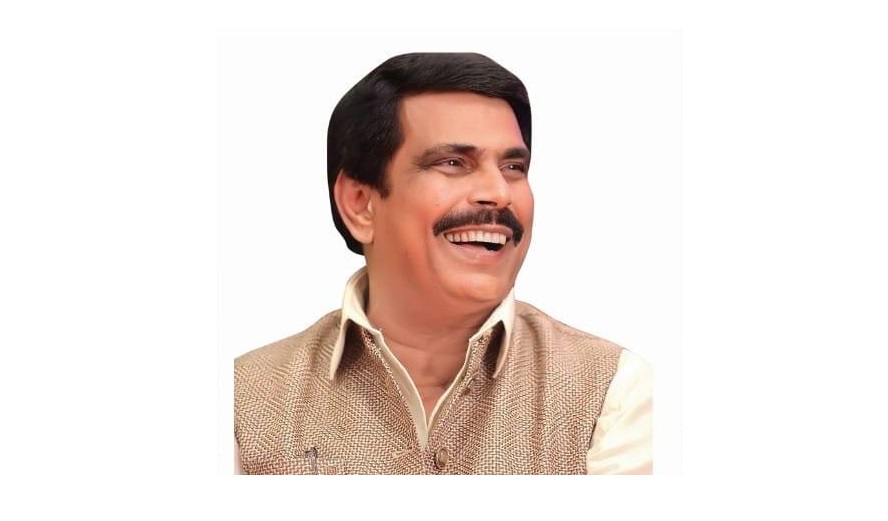
Ashish Bhardwaj
Saharsa, a city that sleeps with half-opened eyes, conceals its quaint charm within the humdrum of everyday life. Amidst its modest existence, the name that echoes through the alleyways and reaches the ears of many is that of Anand Mohan Singh. Just six kilometers from the city lies his native village, and since his release from jail six months ago after a 16-year confinement, he has remained a prominent figure in headlines.
In the backdrop of Saharsa’s historical and political evolution, this narrative attempts to decipher the societal reactions following Anand Mohan’s return.
Let’s rewind to 1966 when Shivbhushan Dutt, now a retired teacher, and Anand Mohan Singh were schoolmates at High School, Triveniganj (now General High School). Reflecting on those times, Dutt fondly recalls Anand Mohan’s ordinary yet spirited demeanor. “Whenever we craved a patriotic song, we summoned Mohan. His impassioned rendition of patriotic melodies resonated with us. It felt like the spirits of Bhagat Singh and Bose had infused him,” Dutt shares with a smile.
Both Dutt and Mohan were active participants in the student movement of 1974. Dutt emphasizes the surge in donations, stating, “After Anand Mohan joined, the donations skyrocketed into thousands. His organizational skills were commendable.” When queried about potential caste or social mobilization in his current political endeavors, Dutt acknowledges the challenges but admires Mohan’s organizational prowess, stating, “He formed a party and contested elections across Bihar.”
In the early nineties, Anand Mohan won the Mahishi assembly seat with a significant margin. His controversial appearance on the cover of Maya Magazine in 1991, flanked by armed individuals, sparked nationwide discussions and criticisms of Bihar’s political landscape.
The turning point came on December 5, 1994, during Chhotan Shukla’s funeral procession, where a mob, including Anand Mohan, was implicated in the killing of Gopalganj District Magistrate G Krishnayya. Anand Mohan was sentenced to death in 2007, later commuted to life imprisonment after a year. After sixteen years behind bars, he emerged in April this year, capturing the public’s attention once again.
An attempt to gain insights from Anand Mohan himself revealed a man focused on upcoming events, including the unveiling of his grandfather’s life-size statue on the 27th. Brushing off unnecessary controversies, he expressed his commitment to carrying on the legacy of his ancestors.
Addressing concerns about his image, Anand Mohan asserted his socialist roots and emphasized that politics isn’t a business but requires moral and character strength. Refuting social media, he stated, “We are not on Facebook and Twitter. We live among the public.”
Anand Mohan, known for upholding secularism, remains unfazed by the RSS network, denouncing it as based on lies and narrow-mindedness. When asked about Prime Minister Narendra Modi, he expressed concerns about the economic condition of the country and criticized the disparity between the common people and wealthy industrialists.
Reflecting on his leadership within the Rajput community, Anand Mohan affirmed widespread respect but emphasized the diversity of opinions within the community. Disapproving of RJD’s Manoj Jha’s recent comments, Anand Mohan defended Thakurs’ contributions, citing the need for mutual respect.
Here I suddenly remembered that line of Phanishwar Nath Renu, in which he says that “जाति बहुत बड़ी चीज है. जात-पात नहीं मानने वाले की भी जाति होती है.”
Anand Mohan recited another poem of Omprakash Valmiki, which is below.
मेरी माँ ने जने सब अछूत ही अछूत
तुम्हारी माँ ने सब बामन ही बामन।
कितने ताज्जुब की बात है
जबकि प्रजनन-क्रिया एक ही जैसी है।
Anand Mohan challenges Manoj Jha, stating, “If Manoj Jha possesses the courage, he should come to Bangaon and recite this poem. Then he will come to know what it means. Manoj Jha is a learned man but he should not have spoken like this in Parliament. Even Kabir used to worship Thakur. There is Thakurbari in every village of Bihar.”
As the conversation delved into philosophy, Anand Mohan asserted the enduring relevance of Gandhi and Marx, suggesting that individuals lean towards one when disheartened by the other. In concluding remarks, he drew parallels between the cleanliness campaign and Gandhi’s principles.
Local sentiments toward Anand Mohan remain mixed, with some expressing admiration for his leadership, while others recall a tumultuous period of caste-based tensions during the nineties. Political analysts speculate on Anand Mohan’s potential shift to JD(U), recognizing his influence among Rajput voters in Bihar.
Despite attempts to gather varied opinions, the prevailing fear of unknown consequences limited open discussions which reminds the couplets of Akbar Allahabadi:
शेर कहता है बज़्म से न टलो
दाद लो, वाह की हवा में पलो
वक़्त कहता है काफ़िया है तंग
चुप रहो, भाग जाओ, साँस न लो
Anand Mohan’s return unfolds against the backdrop of Saharsa’s intricate political landscape, leaving many to ponder the future trajectory of this enigmatic figure and the city’s evolving narrative.
(Ashish Bhardwaj is a senior journalist)


